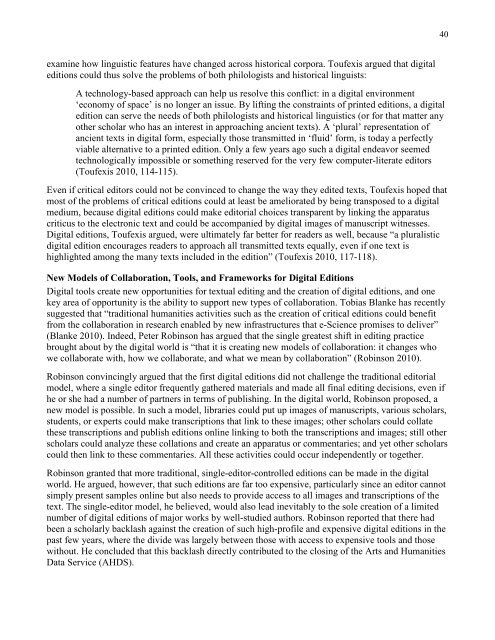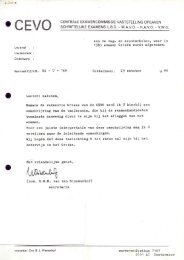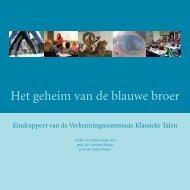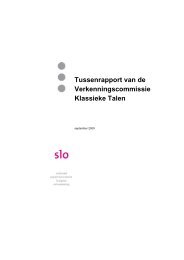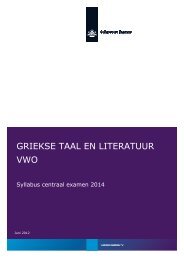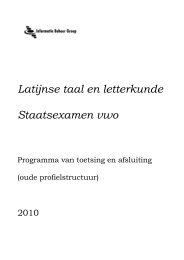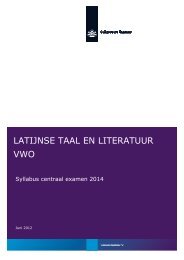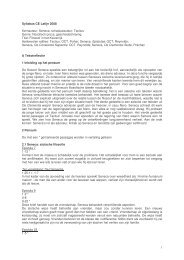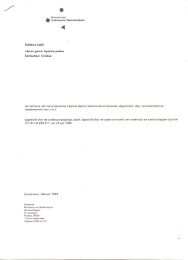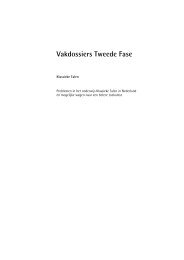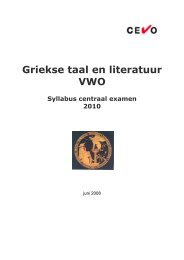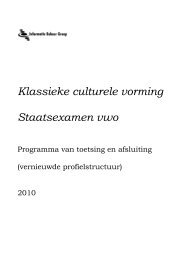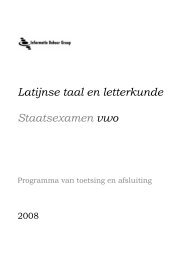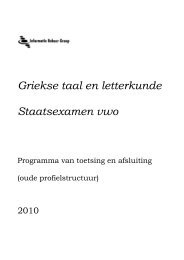Rome Wasn't Digitized in a Day - Council on Library and Information ...
Rome Wasn't Digitized in a Day - Council on Library and Information ...
Rome Wasn't Digitized in a Day - Council on Library and Information ...
You also want an ePaper? Increase the reach of your titles
YUMPU automatically turns print PDFs into web optimized ePapers that Google loves.
40<br />
exam<str<strong>on</strong>g>in</str<strong>on</strong>g>e how l<str<strong>on</strong>g>in</str<strong>on</strong>g>guistic features have changed across historical corpora. Toufexis argued that digital<br />
editi<strong>on</strong>s could thus solve the problems of both philologists <strong>and</strong> historical l<str<strong>on</strong>g>in</str<strong>on</strong>g>guists:<br />
A technology-based approach can help us resolve this c<strong>on</strong>flict: <str<strong>on</strong>g>in</str<strong>on</strong>g> a digital envir<strong>on</strong>ment<br />
‘ec<strong>on</strong>omy of space’ is no l<strong>on</strong>ger an issue. By lift<str<strong>on</strong>g>in</str<strong>on</strong>g>g the c<strong>on</strong>stra<str<strong>on</strong>g>in</str<strong>on</strong>g>ts of pr<str<strong>on</strong>g>in</str<strong>on</strong>g>ted editi<strong>on</strong>s, a digital<br />
editi<strong>on</strong> can serve the needs of both philologists <strong>and</strong> historical l<str<strong>on</strong>g>in</str<strong>on</strong>g>guistics (or for that matter any<br />
other scholar who has an <str<strong>on</strong>g>in</str<strong>on</strong>g>terest <str<strong>on</strong>g>in</str<strong>on</strong>g> approach<str<strong>on</strong>g>in</str<strong>on</strong>g>g ancient texts). A ‘plural’ representati<strong>on</strong> of<br />
ancient texts <str<strong>on</strong>g>in</str<strong>on</strong>g> digital form, especially those transmitted <str<strong>on</strong>g>in</str<strong>on</strong>g> ‘fluid’ form, is today a perfectly<br />
viable alternative to a pr<str<strong>on</strong>g>in</str<strong>on</strong>g>ted editi<strong>on</strong>. Only a few years ago such a digital endeavor seemed<br />
technologically impossible or someth<str<strong>on</strong>g>in</str<strong>on</strong>g>g reserved for the very few computer-literate editors<br />
(Toufexis 2010, 114-115).<br />
Even if critical editors could not be c<strong>on</strong>v<str<strong>on</strong>g>in</str<strong>on</strong>g>ced to change the way they edited texts, Toufexis hoped that<br />
most of the problems of critical editi<strong>on</strong>s could at least be ameliorated by be<str<strong>on</strong>g>in</str<strong>on</strong>g>g transposed to a digital<br />
medium, because digital editi<strong>on</strong>s could make editorial choices transparent by l<str<strong>on</strong>g>in</str<strong>on</strong>g>k<str<strong>on</strong>g>in</str<strong>on</strong>g>g the apparatus<br />
criticus to the electr<strong>on</strong>ic text <strong>and</strong> could be accompanied by digital images of manuscript witnesses.<br />
Digital editi<strong>on</strong>s, Toufexis argued, were ultimately far better for readers as well, because “a pluralistic<br />
digital editi<strong>on</strong> encourages readers to approach all transmitted texts equally, even if <strong>on</strong>e text is<br />
highlighted am<strong>on</strong>g the many texts <str<strong>on</strong>g>in</str<strong>on</strong>g>cluded <str<strong>on</strong>g>in</str<strong>on</strong>g> the editi<strong>on</strong>” (Toufexis 2010, 117-118).<br />
New Models of Collaborati<strong>on</strong>, Tools, <strong>and</strong> Frameworks for Digital Editi<strong>on</strong>s<br />
Digital tools create new opportunities for textual edit<str<strong>on</strong>g>in</str<strong>on</strong>g>g <strong>and</strong> the creati<strong>on</strong> of digital editi<strong>on</strong>s, <strong>and</strong> <strong>on</strong>e<br />
key area of opportunity is the ability to support new types of collaborati<strong>on</strong>. Tobias Blanke has recently<br />
suggested that “traditi<strong>on</strong>al humanities activities such as the creati<strong>on</strong> of critical editi<strong>on</strong>s could benefit<br />
from the collaborati<strong>on</strong> <str<strong>on</strong>g>in</str<strong>on</strong>g> research enabled by new <str<strong>on</strong>g>in</str<strong>on</strong>g>frastructures that e-Science promises to deliver”<br />
(Blanke 2010). Indeed, Peter Rob<str<strong>on</strong>g>in</str<strong>on</strong>g>s<strong>on</strong> has argued that the s<str<strong>on</strong>g>in</str<strong>on</strong>g>gle greatest shift <str<strong>on</strong>g>in</str<strong>on</strong>g> edit<str<strong>on</strong>g>in</str<strong>on</strong>g>g practice<br />
brought about by the digital world is “that it is creat<str<strong>on</strong>g>in</str<strong>on</strong>g>g new models of collaborati<strong>on</strong>: it changes who<br />
we collaborate with, how we collaborate, <strong>and</strong> what we mean by collaborati<strong>on</strong>” (Rob<str<strong>on</strong>g>in</str<strong>on</strong>g>s<strong>on</strong> 2010).<br />
Rob<str<strong>on</strong>g>in</str<strong>on</strong>g>s<strong>on</strong> c<strong>on</strong>v<str<strong>on</strong>g>in</str<strong>on</strong>g>c<str<strong>on</strong>g>in</str<strong>on</strong>g>gly argued that the first digital editi<strong>on</strong>s did not challenge the traditi<strong>on</strong>al editorial<br />
model, where a s<str<strong>on</strong>g>in</str<strong>on</strong>g>gle editor frequently gathered materials <strong>and</strong> made all f<str<strong>on</strong>g>in</str<strong>on</strong>g>al edit<str<strong>on</strong>g>in</str<strong>on</strong>g>g decisi<strong>on</strong>s, even if<br />
he or she had a number of partners <str<strong>on</strong>g>in</str<strong>on</strong>g> terms of publish<str<strong>on</strong>g>in</str<strong>on</strong>g>g. In the digital world, Rob<str<strong>on</strong>g>in</str<strong>on</strong>g>s<strong>on</strong> proposed, a<br />
new model is possible. In such a model, libraries could put up images of manuscripts, various scholars,<br />
students, or experts could make transcripti<strong>on</strong>s that l<str<strong>on</strong>g>in</str<strong>on</strong>g>k to these images; other scholars could collate<br />
these transcripti<strong>on</strong>s <strong>and</strong> publish editi<strong>on</strong>s <strong>on</strong>l<str<strong>on</strong>g>in</str<strong>on</strong>g>e l<str<strong>on</strong>g>in</str<strong>on</strong>g>k<str<strong>on</strong>g>in</str<strong>on</strong>g>g to both the transcripti<strong>on</strong>s <strong>and</strong> images; still other<br />
scholars could analyze these collati<strong>on</strong>s <strong>and</strong> create an apparatus or commentaries; <strong>and</strong> yet other scholars<br />
could then l<str<strong>on</strong>g>in</str<strong>on</strong>g>k to these commentaries. All these activities could occur <str<strong>on</strong>g>in</str<strong>on</strong>g>dependently or together.<br />
Rob<str<strong>on</strong>g>in</str<strong>on</strong>g>s<strong>on</strong> granted that more traditi<strong>on</strong>al, s<str<strong>on</strong>g>in</str<strong>on</strong>g>gle-editor-c<strong>on</strong>trolled editi<strong>on</strong>s can be made <str<strong>on</strong>g>in</str<strong>on</strong>g> the digital<br />
world. He argued, however, that such editi<strong>on</strong>s are far too expensive, particularly s<str<strong>on</strong>g>in</str<strong>on</strong>g>ce an editor cannot<br />
simply present samples <strong>on</strong>l<str<strong>on</strong>g>in</str<strong>on</strong>g>e but also needs to provide access to all images <strong>and</strong> transcripti<strong>on</strong>s of the<br />
text. The s<str<strong>on</strong>g>in</str<strong>on</strong>g>gle-editor model, he believed, would also lead <str<strong>on</strong>g>in</str<strong>on</strong>g>evitably to the sole creati<strong>on</strong> of a limited<br />
number of digital editi<strong>on</strong>s of major works by well-studied authors. Rob<str<strong>on</strong>g>in</str<strong>on</strong>g>s<strong>on</strong> reported that there had<br />
been a scholarly backlash aga<str<strong>on</strong>g>in</str<strong>on</strong>g>st the creati<strong>on</strong> of such high-profile <strong>and</strong> expensive digital editi<strong>on</strong>s <str<strong>on</strong>g>in</str<strong>on</strong>g> the<br />
past few years, where the divide was largely between those with access to expensive tools <strong>and</strong> those<br />
without. He c<strong>on</strong>cluded that this backlash directly c<strong>on</strong>tributed to the clos<str<strong>on</strong>g>in</str<strong>on</strong>g>g of the Arts <strong>and</strong> Humanities<br />
Data Service (AHDS).


